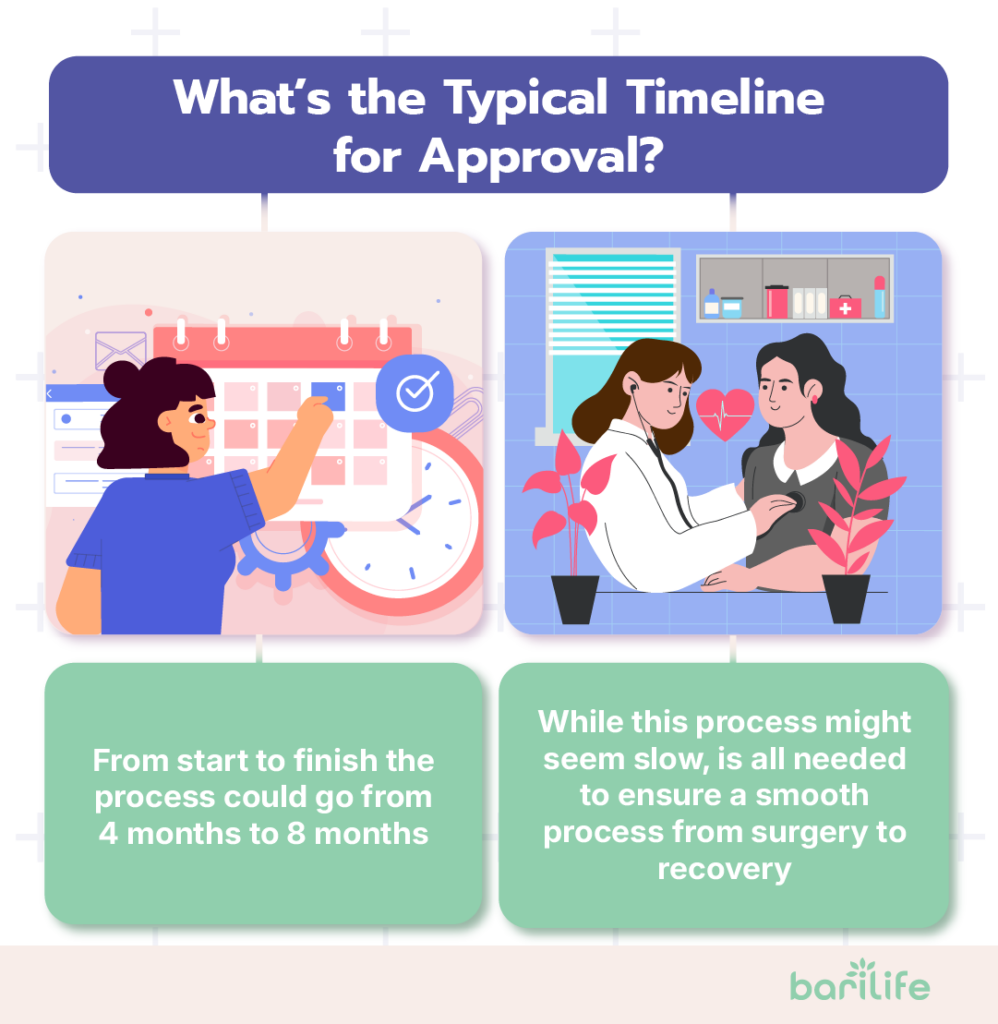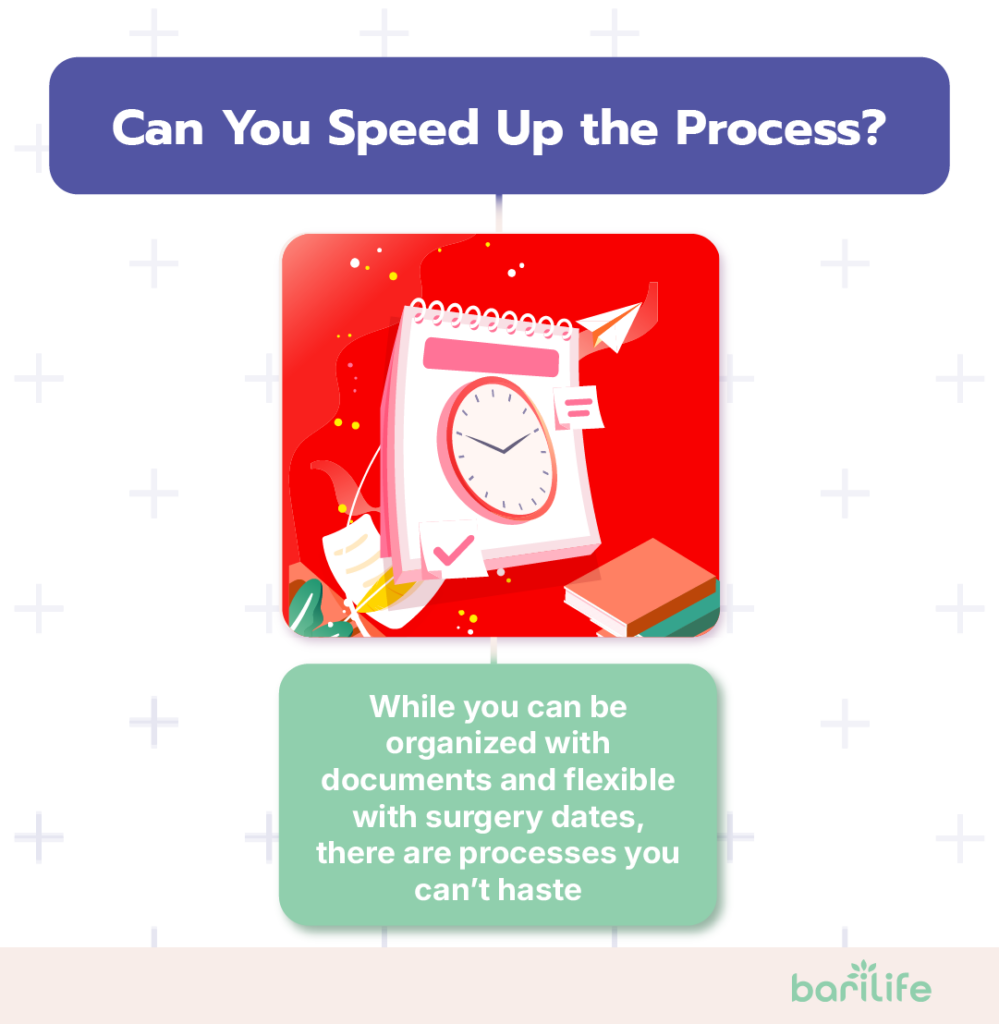Key Takeaways
- The time it takes to get bariatric surgery varies, typically ranging from 4 to 8 months, depending on insurance requirements, medical evaluations, and surgeon availability.
- Staying organized, completing all medical and insurance requirements promptly, and being flexible with scheduling can help speed up the process.
- While self-pay can shorten wait times by skipping insurance approval, it’s crucial to follow all necessary medical and psychological evaluations to ensure safety and success.
The timeline for bariatric surgery varies slightly from person to person. From insurance requirements to medical evaluations, scheduling availability, and personal preparedness, the process can take anywhere from a few months to almost a year.
Knowing what to expect and taking the right steps can help you get through the process as quickly and efficiently as possible.
In this guide, we walk through the key factors that influence how fast you can get bariatric surgery, ways to speed up the approval process, and the risks of rushing into the procedure too quickly.
By the end, you’ll have a clearer picture of what to expect and how to prepare for this important step in your weight-loss journey.
[/box]
Factors That Affect How Fast You Get Approved

The time it takes to get approval for bariatric surgery isn’t the same for everyone. Here are some of the biggest factors that can speed up or slow down the process:
Insurance Requirements
If you're using insurance, your policy will play a major role in how quickly you get approved. Some insurance plans require:
- Documented weight loss attempts: You might need to show proof that you’ve tried to lose weight through diet and exercise before turning to surgery.
- Specific BMI thresholds: Your (Body Mass Index) BMI for bariatric surgery
- often needs to be above a certain number to qualify.
- Medical evaluations: Some insurance plans require proof of other health conditions related to weight, such as diabetes or high blood pressure.
Because every insurance company has different rules, it’s important to check your policy as early as possible. The sooner you understand what’s required, the sooner you can meet those bariatric surgery requirements and move forward.
Medical Evaluations
Before surgery, your medical team needs to make sure it’s safe for you. This means you’ll likely need:
- A full medical assessment: Your health provider will check for any conditions that might make surgery risky, such as congestive heart failure, chronic kidney disease, or chronic obstructive pulmonary disease.
- Psychological evaluation: Since bariatric surgery affects not just your body but also your lifestyle and mental well-being, a mental health professional may need to confirm you’re ready for the changes ahead. Knowing how to pass a bariatric psych evaluation can be helpful.
- Nutritional counseling: You’ll need to learn about the dietary changes required before and after surgery.
Completing these evaluations as soon as possible can help speed up your approval.
Surgeon and Facility Availability
Even if you’re fully approved, the wait time for your surgery depends on how busy your chosen surgeon and hospital are. If the facility has a long waitlist, you may need to schedule your procedure months in advance.

Finding a surgeon with more availability or being flexible with your schedule might help you get an earlier date.
Your Own Preparedness
While some delays are beyond your control, many setbacks come from missing key steps or not being fully prepared. Common reasons for extended wait times include:
- Incomplete medical evaluations: If tests reveal underlying health issues (such as uncontrolled diabetes or heart conditions), you may need additional treatment before being cleared for surgery.
- Psychological assessment concerns: If mental health concerns, eating disorders, or a lack of readiness for major lifestyle changes arise during the evaluation, additional counseling or support may be required.
- Failure to meet pre-surgery diet and lifestyle requirements: Many programs require weight loss, smoking cessation, or specific dietary changes before approval. Struggling to follow these guidelines can push back your surgery date.
- Insurance roadblocks: Missing documentation, slow approvals, or changes in coverage can create unexpected delays.
- Missed appointments and paperwork issues: Failing to complete required consultations or submit necessary forms on time can slow down the process.
To avoid unnecessary delays, stay organized, communicate with your medical team, and actively prepare for the lifestyle adjustments needed for long-term success.
What’s the Typical Timeline for Approval?
The process of getting approved for bariatric surgery varies from person to person, but most patients can expect the journey to take several months.
From First Consultation to Approval: 3 to 6 Months
The first phase involves meeting with your bariatric surgeon and completing the necessary medical and insurance steps. Your surgeon will review your medical history, discuss your weight loss goals, and determine if surgery is the right option for you.
Gathering and submitting all your insurance requirements and medical records can take weeks or months.
Once all requirements are met, your insurance provider will review your case and issue final approval. This step can take anywhere from a few weeks to a couple of months, depending on your provider’s process.

From Approval to Surgery Date: 4 to 6 Weeks
Once approved, you’ll move into the final pre-surgery phase.
Your procedure date depends on the availability of your surgeon and the hospital’s surgical schedule. Some facilities have long waitlists, while others may have openings sooner.
Most people must follow a strict preoperative diet to shrink the liver and reduce surgical risks. This phase also helps mentally prepare for the significant lifestyle changes that come after surgery.
Total Estimated Timeline: 4 to 8 Months Or More
If everything goes smoothly and you stay proactive with scheduling appointments, submitting paperwork, and meeting requirements, you could complete the process within 4 to 8 months from your first consultation. However, delays can occur due to insurance holdups, additional medical evaluations, or difficulty adjusting to pre-surgery dietary changes.
Staying organized, communicating with your healthcare team, and following all necessary steps can help you navigate the process efficiently and move forward with your weight loss journey.
Can You Speed Up the Process?
There are several ways you can try to avoid unnecessary delays, but keep in mind many factors are out of your control. Here’s how you can help move things along:
Get Organized with Your Documentation
Your insurance company and surgeon’s office will require a lot of paperwork. To help the process go smoothly, be sure to:
- Have all your medical records ready
- Complete necessary tests and evaluations as soon as possible
- Follow up on any missing paperwork
Being proactive can prevent back-and-forth delays that can add weeks or even months to the process. If you're wondering how to get bariatric surgery fast, having all necessary documents prepared in advance is one of the most effective steps.
Understand Your Insurance Requirements Early
One of the biggest holdups can be insurance approvals. Here are several ways can get ahead of the game:
- Check your insurance policy early
- Complete all required steps
- Follow up with your insurance provider
Be Flexible with Your Surgery Date

If you’re willing to take an earlier available date, you might be able to get surgery sooner. Some hospitals also have last-minute openings due to cancellations. Let your surgeon’s office know that you’re open to scheduling changes if possible.
Are There Risks to Rushing the Process?
While getting surgery sooner can be exciting, skipping steps or rushing through requirements can have serious downsides. Here are several factors to consider.
Incomplete Evaluations Can Miss Important Health Issues
Medical evaluations are there to ensure you’re healthy enough for surgery. Skipping or rushing through these could mean missing potential risks that could lead to complications during or after surgery.
Not Enough Time to Prepare Can Make Recovery Harder
Bariatric surgery isn’t just a physical change—it’s a complete lifestyle shift. If you don’t take the time to fully understand what’s required before and after surgery, you might struggle with the necessary adjustments.
Higher Risk of Complications
If you rush through the pre-surgery steps, you might increase your chances of complications. Surgery requires proper preparation, and taking shortcuts could put your health at risk.
What About Self-Pay? Does It Make Things Faster?
Some people choose to pay for bariatric surgery out of pocket instead of going through insurance. The upside is that without needing to wait for insurance approvals, you may get faster scheduling. You also have the added flexibility of choosing your surgeon or facility.
The downside is the higher cost. Out-of-pocket costs can be tens of thousands of dollars. You may need to explore financing options if you can’t pay upfront.
No insurance oversight also means you’re responsible for your own care. Insurance companies often require evaluations to ensure safety. If you self-pay, make sure you still complete all necessary medical and psychological assessments so you’re fully prepared.
Conclusion

The time it takes to get bariatric surgery varies based on insurance, medical evaluations, and availability. On average, you can expect the process to take four to eight months from your first consultation to surgery.
By staying organized, following up on insurance requirements, and preparing yourself mentally and physically, you can help speed up the process while ensuring a safe and successful surgery.
If you’re ready to start, talk to your health provider about the next steps and begin gathering the necessary information today!
How Bari Life Can Help
Bari Life offers high-quality bariatric vitamins designed to support people before and after bariatric surgery, ensuring they meet essential nutritional needs. Our comprehensive range includes bariatric multivitamins, bariatric multivitamin with iron, and bariatric vitamins chewable, making it easy for patients to maintain proper vitamin intake based on their unique needs.
Recovery after bariatric surgery requires more than just standard supplements. That’s why we provide liquid bariatric vitamin options for those who prefer an easy-to-digest form. Additionally, our bariatric calcium chews help support bone health, while our bariatric probiotic aids digestion and gut health.
Beyond vitamins, nutrition is key to a successful bariatric journey. We offer bariatric protein shakes and bariatric protein bars to help patients meet their daily protein goals with ease. For those looking for healthier snack alternatives, our bariatric snacks provide delicious, portion-controlled options.
Hair thinning can be a concern for many patients after surgery, and proper nutrition plays a critical role. Our specialized bariatric vitamins for hair loss support healthy hair growth by addressing potential nutrient deficiencies.
Explore our products today to support your bariatric journey with the right nutrition!
If you want to learn more, why not check out these articles below:
- Can You Have Bariatric Surgery If You Have H Pylori?
- What Can Disqualify You From Bariatric Surgery?
- Am I a Candidate For Bariatric Surgery?
- When is Bariatric Surgery Recommended?
- Is Bariatric Surgery Right For Me?
- What is a Bariatric Patient?
References
Alvarez, R., et al. (2019). Factors Associated With Long Wait Times for Bariatric Surgery. Ann Surg.

Leave a Comment
Your email address will not be published.